Work-Based Responsible Leadership: Ethical, Cross-Cultural Analysis
VerifiedAdded on 2022/08/23
|16
|3714
|20
Report
AI Summary
This report delves into the multifaceted concept of work-based responsible leadership, exploring its significance within organizational contexts. It examines three key leadership styles: ethical leadership, emphasizing moral conduct and pro-social behavior; cross-cultural leadership, focusing on generating trust within diverse teams; and transactional leadership, highlighting the use of rewards and punishments to motivate followers and its connection to organizational citizenship behavior. The report includes a self-assessment analysis based on the CARL test, evaluating the student's strengths and weaknesses in relation to these leadership styles. Finally, it culminates in a personalized development plan aimed at enhancing leadership capabilities, providing a practical roadmap for improvement and growth.
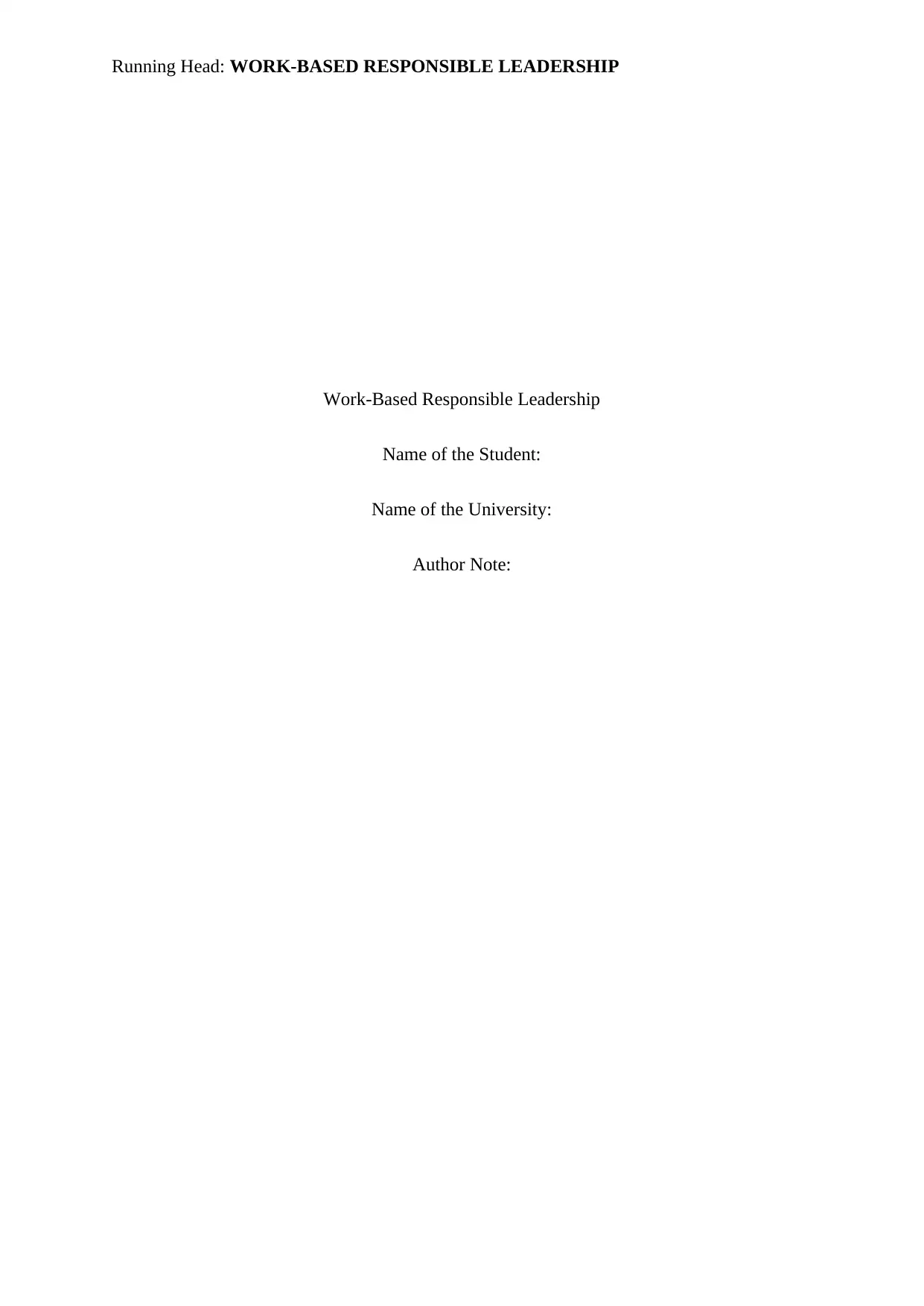
Running Head: WORK-BASED RESPONSIBLE LEADERSHIP
Work-Based Responsible Leadership
Name of the Student:
Name of the University:
Author Note:
Work-Based Responsible Leadership
Name of the Student:
Name of the University:
Author Note:
Paraphrase This Document
Need a fresh take? Get an instant paraphrase of this document with our AI Paraphraser
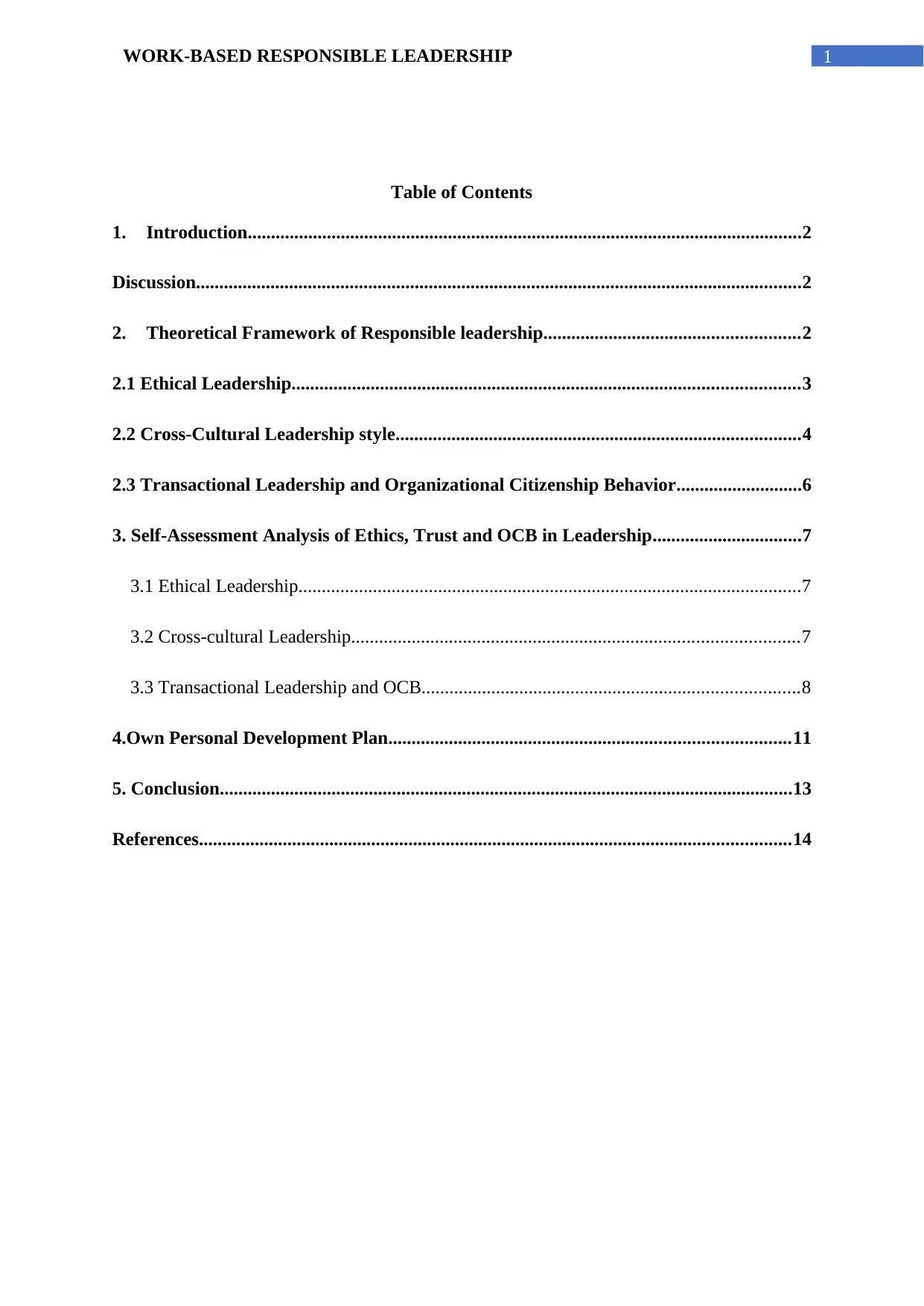
1WORK-BASED RESPONSIBLE LEADERSHIP
Table of Contents
1. Introduction.......................................................................................................................2
Discussion..................................................................................................................................2
2. Theoretical Framework of Responsible leadership.......................................................2
2.1 Ethical Leadership.............................................................................................................3
2.2 Cross-Cultural Leadership style.......................................................................................4
2.3 Transactional Leadership and Organizational Citizenship Behavior...........................6
3. Self-Assessment Analysis of Ethics, Trust and OCB in Leadership................................7
3.1 Ethical Leadership............................................................................................................7
3.2 Cross-cultural Leadership................................................................................................7
3.3 Transactional Leadership and OCB.................................................................................8
4.Own Personal Development Plan......................................................................................11
5. Conclusion...........................................................................................................................13
References...............................................................................................................................14
Table of Contents
1. Introduction.......................................................................................................................2
Discussion..................................................................................................................................2
2. Theoretical Framework of Responsible leadership.......................................................2
2.1 Ethical Leadership.............................................................................................................3
2.2 Cross-Cultural Leadership style.......................................................................................4
2.3 Transactional Leadership and Organizational Citizenship Behavior...........................6
3. Self-Assessment Analysis of Ethics, Trust and OCB in Leadership................................7
3.1 Ethical Leadership............................................................................................................7
3.2 Cross-cultural Leadership................................................................................................7
3.3 Transactional Leadership and OCB.................................................................................8
4.Own Personal Development Plan......................................................................................11
5. Conclusion...........................................................................................................................13
References...............................................................................................................................14
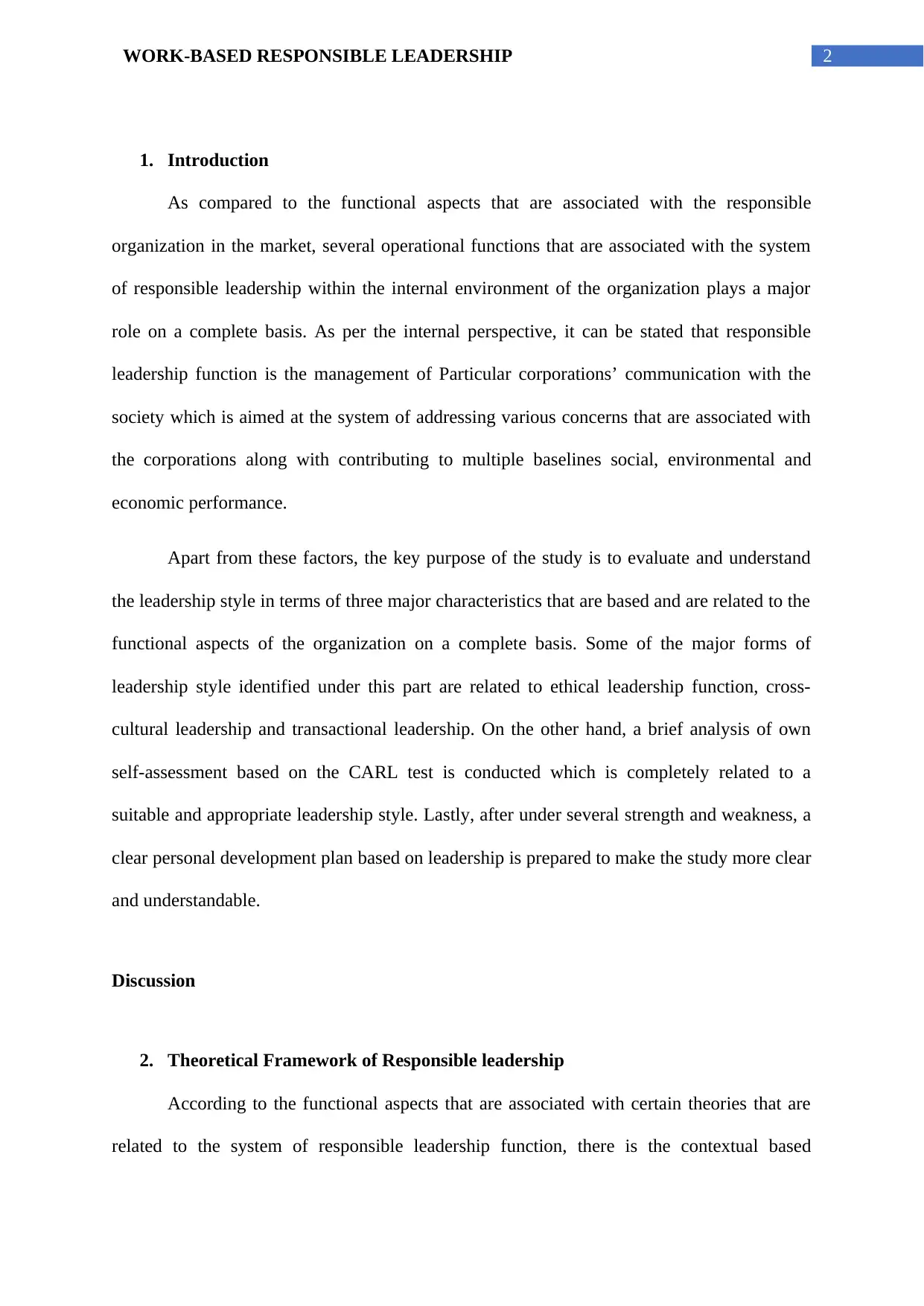
2WORK-BASED RESPONSIBLE LEADERSHIP
1. Introduction
As compared to the functional aspects that are associated with the responsible
organization in the market, several operational functions that are associated with the system
of responsible leadership within the internal environment of the organization plays a major
role on a complete basis. As per the internal perspective, it can be stated that responsible
leadership function is the management of Particular corporations’ communication with the
society which is aimed at the system of addressing various concerns that are associated with
the corporations along with contributing to multiple baselines social, environmental and
economic performance.
Apart from these factors, the key purpose of the study is to evaluate and understand
the leadership style in terms of three major characteristics that are based and are related to the
functional aspects of the organization on a complete basis. Some of the major forms of
leadership style identified under this part are related to ethical leadership function, cross-
cultural leadership and transactional leadership. On the other hand, a brief analysis of own
self-assessment based on the CARL test is conducted which is completely related to a
suitable and appropriate leadership style. Lastly, after under several strength and weakness, a
clear personal development plan based on leadership is prepared to make the study more clear
and understandable.
Discussion
2. Theoretical Framework of Responsible leadership
According to the functional aspects that are associated with certain theories that are
related to the system of responsible leadership function, there is the contextual based
1. Introduction
As compared to the functional aspects that are associated with the responsible
organization in the market, several operational functions that are associated with the system
of responsible leadership within the internal environment of the organization plays a major
role on a complete basis. As per the internal perspective, it can be stated that responsible
leadership function is the management of Particular corporations’ communication with the
society which is aimed at the system of addressing various concerns that are associated with
the corporations along with contributing to multiple baselines social, environmental and
economic performance.
Apart from these factors, the key purpose of the study is to evaluate and understand
the leadership style in terms of three major characteristics that are based and are related to the
functional aspects of the organization on a complete basis. Some of the major forms of
leadership style identified under this part are related to ethical leadership function, cross-
cultural leadership and transactional leadership. On the other hand, a brief analysis of own
self-assessment based on the CARL test is conducted which is completely related to a
suitable and appropriate leadership style. Lastly, after under several strength and weakness, a
clear personal development plan based on leadership is prepared to make the study more clear
and understandable.
Discussion
2. Theoretical Framework of Responsible leadership
According to the functional aspects that are associated with certain theories that are
related to the system of responsible leadership function, there is the contextual based
⊘ This is a preview!⊘
Do you want full access?
Subscribe today to unlock all pages.

Trusted by 1+ million students worldwide
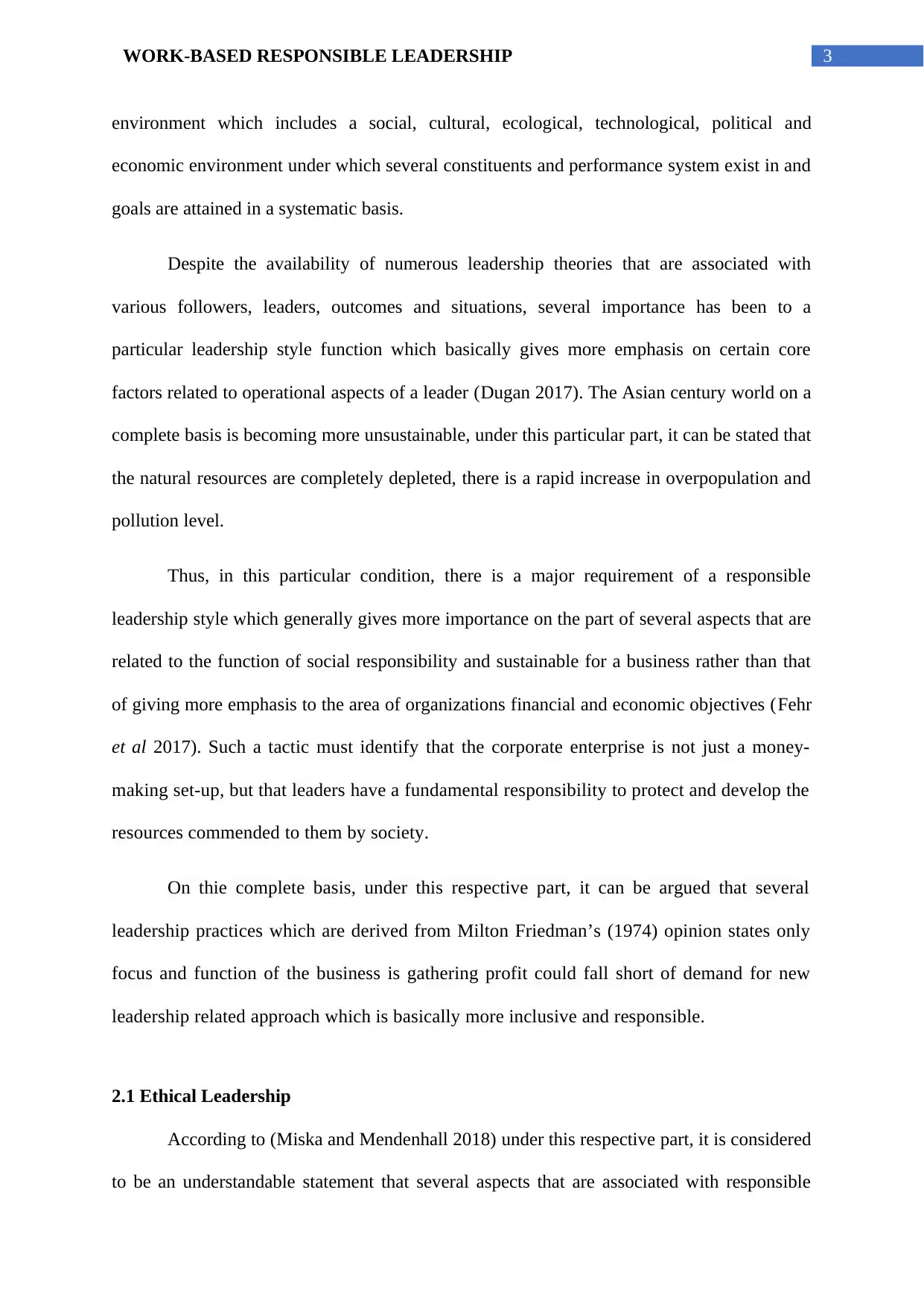
3WORK-BASED RESPONSIBLE LEADERSHIP
environment which includes a social, cultural, ecological, technological, political and
economic environment under which several constituents and performance system exist in and
goals are attained in a systematic basis.
Despite the availability of numerous leadership theories that are associated with
various followers, leaders, outcomes and situations, several importance has been to a
particular leadership style function which basically gives more emphasis on certain core
factors related to operational aspects of a leader (Dugan 2017). The Asian century world on a
complete basis is becoming more unsustainable, under this particular part, it can be stated that
the natural resources are completely depleted, there is a rapid increase in overpopulation and
pollution level.
Thus, in this particular condition, there is a major requirement of a responsible
leadership style which generally gives more importance on the part of several aspects that are
related to the function of social responsibility and sustainable for a business rather than that
of giving more emphasis to the area of organizations financial and economic objectives (Fehr
et al 2017). Such a tactic must identify that the corporate enterprise is not just a money-
making set-up, but that leaders have a fundamental responsibility to protect and develop the
resources commended to them by society.
On thie complete basis, under this respective part, it can be argued that several
leadership practices which are derived from Milton Friedman’s (1974) opinion states only
focus and function of the business is gathering profit could fall short of demand for new
leadership related approach which is basically more inclusive and responsible.
2.1 Ethical Leadership
According to (Miska and Mendenhall 2018) under this respective part, it is considered
to be an understandable statement that several aspects that are associated with responsible
environment which includes a social, cultural, ecological, technological, political and
economic environment under which several constituents and performance system exist in and
goals are attained in a systematic basis.
Despite the availability of numerous leadership theories that are associated with
various followers, leaders, outcomes and situations, several importance has been to a
particular leadership style function which basically gives more emphasis on certain core
factors related to operational aspects of a leader (Dugan 2017). The Asian century world on a
complete basis is becoming more unsustainable, under this particular part, it can be stated that
the natural resources are completely depleted, there is a rapid increase in overpopulation and
pollution level.
Thus, in this particular condition, there is a major requirement of a responsible
leadership style which generally gives more importance on the part of several aspects that are
related to the function of social responsibility and sustainable for a business rather than that
of giving more emphasis to the area of organizations financial and economic objectives (Fehr
et al 2017). Such a tactic must identify that the corporate enterprise is not just a money-
making set-up, but that leaders have a fundamental responsibility to protect and develop the
resources commended to them by society.
On thie complete basis, under this respective part, it can be argued that several
leadership practices which are derived from Milton Friedman’s (1974) opinion states only
focus and function of the business is gathering profit could fall short of demand for new
leadership related approach which is basically more inclusive and responsible.
2.1 Ethical Leadership
According to (Miska and Mendenhall 2018) under this respective part, it is considered
to be an understandable statement that several aspects that are associated with responsible
Paraphrase This Document
Need a fresh take? Get an instant paraphrase of this document with our AI Paraphraser
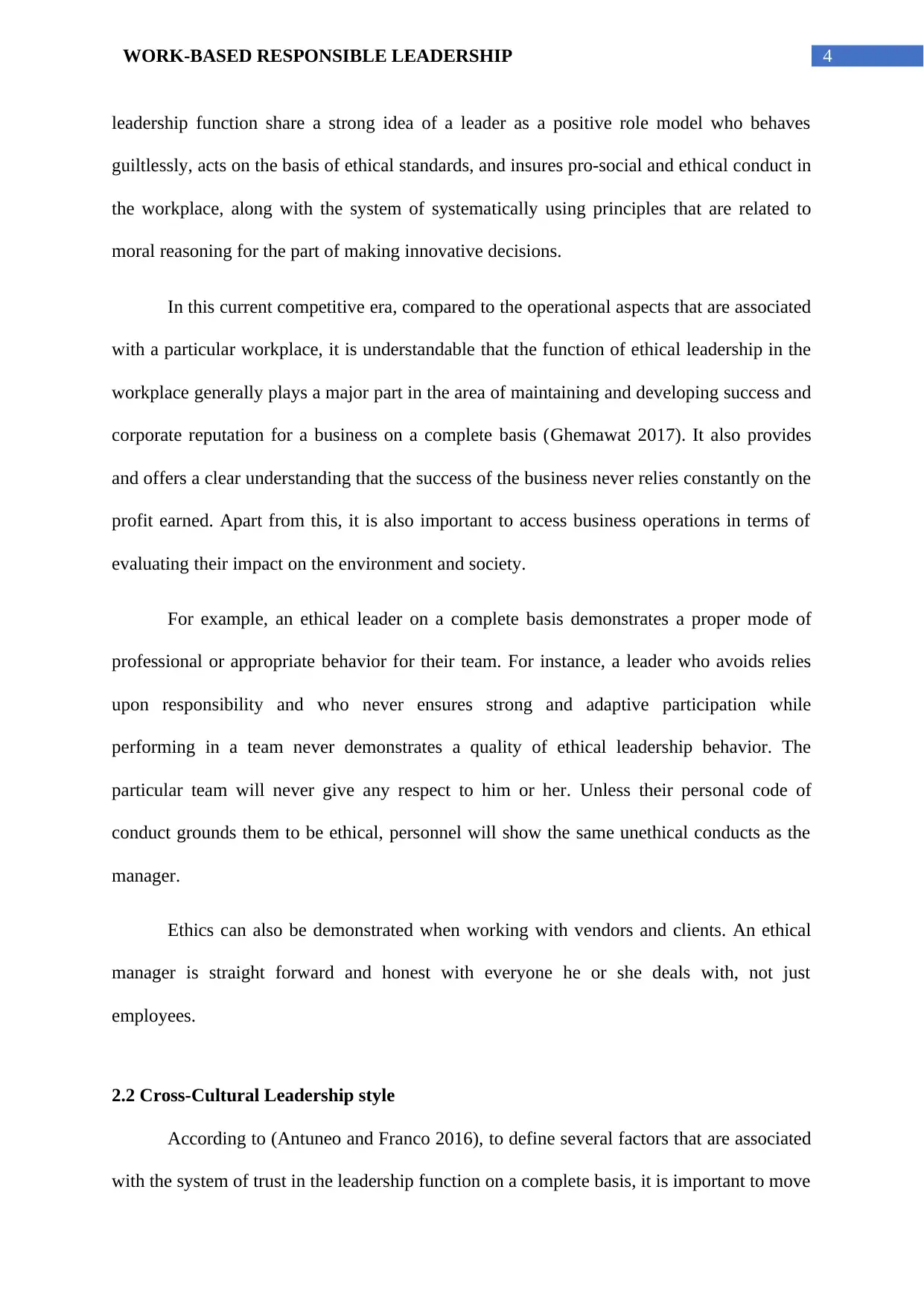
4WORK-BASED RESPONSIBLE LEADERSHIP
leadership function share a strong idea of a leader as a positive role model who behaves
guiltlessly, acts on the basis of ethical standards, and insures pro-social and ethical conduct in
the workplace, along with the system of systematically using principles that are related to
moral reasoning for the part of making innovative decisions.
In this current competitive era, compared to the operational aspects that are associated
with a particular workplace, it is understandable that the function of ethical leadership in the
workplace generally plays a major part in the area of maintaining and developing success and
corporate reputation for a business on a complete basis (Ghemawat 2017). It also provides
and offers a clear understanding that the success of the business never relies constantly on the
profit earned. Apart from this, it is also important to access business operations in terms of
evaluating their impact on the environment and society.
For example, an ethical leader on a complete basis demonstrates a proper mode of
professional or appropriate behavior for their team. For instance, a leader who avoids relies
upon responsibility and who never ensures strong and adaptive participation while
performing in a team never demonstrates a quality of ethical leadership behavior. The
particular team will never give any respect to him or her. Unless their personal code of
conduct grounds them to be ethical, personnel will show the same unethical conducts as the
manager.
Ethics can also be demonstrated when working with vendors and clients. An ethical
manager is straight forward and honest with everyone he or she deals with, not just
employees.
2.2 Cross-Cultural Leadership style
According to (Antuneo and Franco 2016), to define several factors that are associated
with the system of trust in the leadership function on a complete basis, it is important to move
leadership function share a strong idea of a leader as a positive role model who behaves
guiltlessly, acts on the basis of ethical standards, and insures pro-social and ethical conduct in
the workplace, along with the system of systematically using principles that are related to
moral reasoning for the part of making innovative decisions.
In this current competitive era, compared to the operational aspects that are associated
with a particular workplace, it is understandable that the function of ethical leadership in the
workplace generally plays a major part in the area of maintaining and developing success and
corporate reputation for a business on a complete basis (Ghemawat 2017). It also provides
and offers a clear understanding that the success of the business never relies constantly on the
profit earned. Apart from this, it is also important to access business operations in terms of
evaluating their impact on the environment and society.
For example, an ethical leader on a complete basis demonstrates a proper mode of
professional or appropriate behavior for their team. For instance, a leader who avoids relies
upon responsibility and who never ensures strong and adaptive participation while
performing in a team never demonstrates a quality of ethical leadership behavior. The
particular team will never give any respect to him or her. Unless their personal code of
conduct grounds them to be ethical, personnel will show the same unethical conducts as the
manager.
Ethics can also be demonstrated when working with vendors and clients. An ethical
manager is straight forward and honest with everyone he or she deals with, not just
employees.
2.2 Cross-Cultural Leadership style
According to (Antuneo and Franco 2016), to define several factors that are associated
with the system of trust in the leadership function on a complete basis, it is important to move
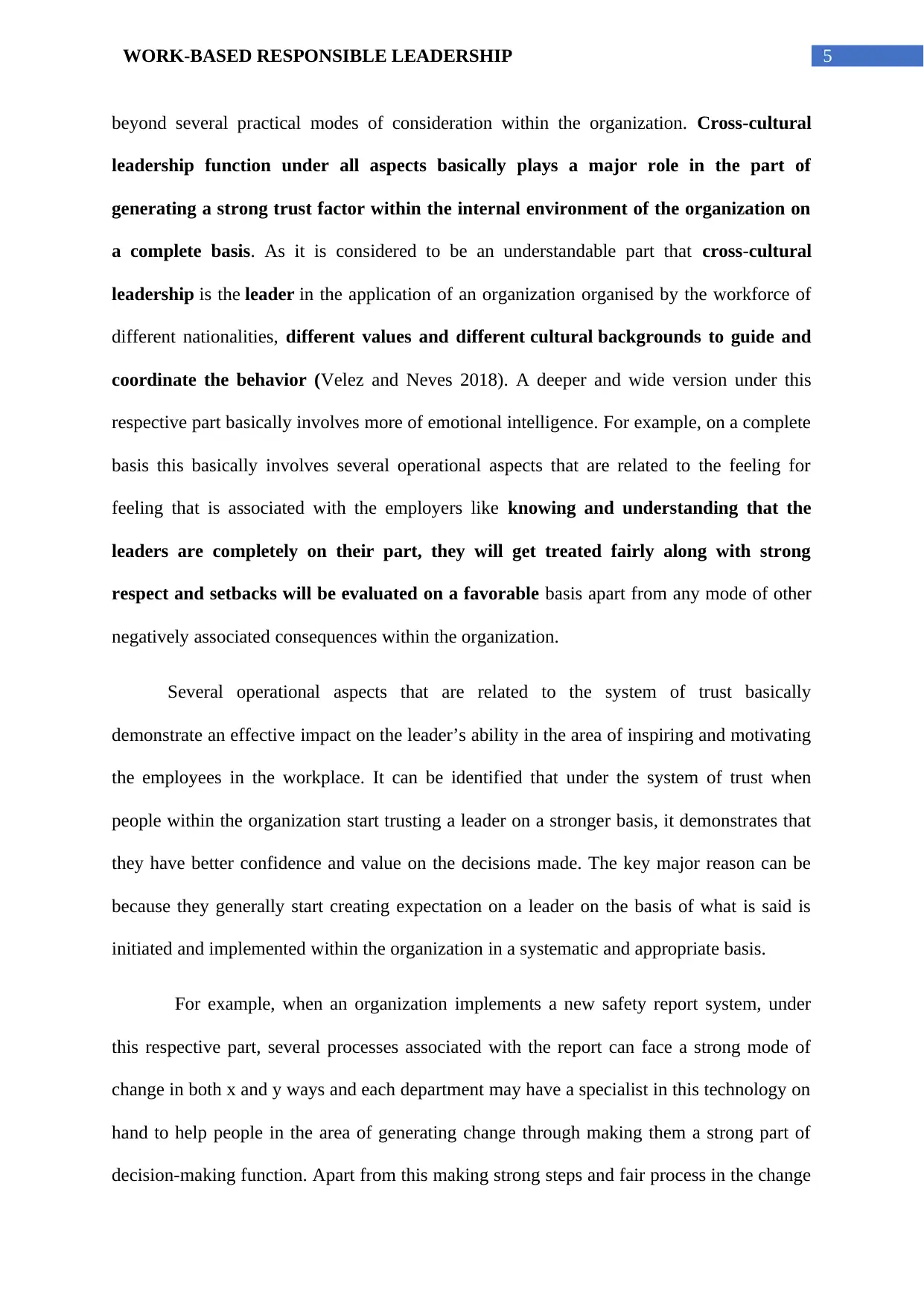
5WORK-BASED RESPONSIBLE LEADERSHIP
beyond several practical modes of consideration within the organization. Cross-cultural
leadership function under all aspects basically plays a major role in the part of
generating a strong trust factor within the internal environment of the organization on
a complete basis. As it is considered to be an understandable part that cross-cultural
leadership is the leader in the application of an organization organised by the workforce of
different nationalities, different values and different cultural backgrounds to guide and
coordinate the behavior (Velez and Neves 2018). A deeper and wide version under this
respective part basically involves more of emotional intelligence. For example, on a complete
basis this basically involves several operational aspects that are related to the feeling for
feeling that is associated with the employers like knowing and understanding that the
leaders are completely on their part, they will get treated fairly along with strong
respect and setbacks will be evaluated on a favorable basis apart from any mode of other
negatively associated consequences within the organization.
Several operational aspects that are related to the system of trust basically
demonstrate an effective impact on the leader’s ability in the area of inspiring and motivating
the employees in the workplace. It can be identified that under the system of trust when
people within the organization start trusting a leader on a stronger basis, it demonstrates that
they have better confidence and value on the decisions made. The key major reason can be
because they generally start creating expectation on a leader on the basis of what is said is
initiated and implemented within the organization in a systematic and appropriate basis.
For example, when an organization implements a new safety report system, under
this respective part, several processes associated with the report can face a strong mode of
change in both x and y ways and each department may have a specialist in this technology on
hand to help people in the area of generating change through making them a strong part of
decision-making function. Apart from this making strong steps and fair process in the change
beyond several practical modes of consideration within the organization. Cross-cultural
leadership function under all aspects basically plays a major role in the part of
generating a strong trust factor within the internal environment of the organization on
a complete basis. As it is considered to be an understandable part that cross-cultural
leadership is the leader in the application of an organization organised by the workforce of
different nationalities, different values and different cultural backgrounds to guide and
coordinate the behavior (Velez and Neves 2018). A deeper and wide version under this
respective part basically involves more of emotional intelligence. For example, on a complete
basis this basically involves several operational aspects that are related to the feeling for
feeling that is associated with the employers like knowing and understanding that the
leaders are completely on their part, they will get treated fairly along with strong
respect and setbacks will be evaluated on a favorable basis apart from any mode of other
negatively associated consequences within the organization.
Several operational aspects that are related to the system of trust basically
demonstrate an effective impact on the leader’s ability in the area of inspiring and motivating
the employees in the workplace. It can be identified that under the system of trust when
people within the organization start trusting a leader on a stronger basis, it demonstrates that
they have better confidence and value on the decisions made. The key major reason can be
because they generally start creating expectation on a leader on the basis of what is said is
initiated and implemented within the organization in a systematic and appropriate basis.
For example, when an organization implements a new safety report system, under
this respective part, several processes associated with the report can face a strong mode of
change in both x and y ways and each department may have a specialist in this technology on
hand to help people in the area of generating change through making them a strong part of
decision-making function. Apart from this making strong steps and fair process in the change
⊘ This is a preview!⊘
Do you want full access?
Subscribe today to unlock all pages.

Trusted by 1+ million students worldwide
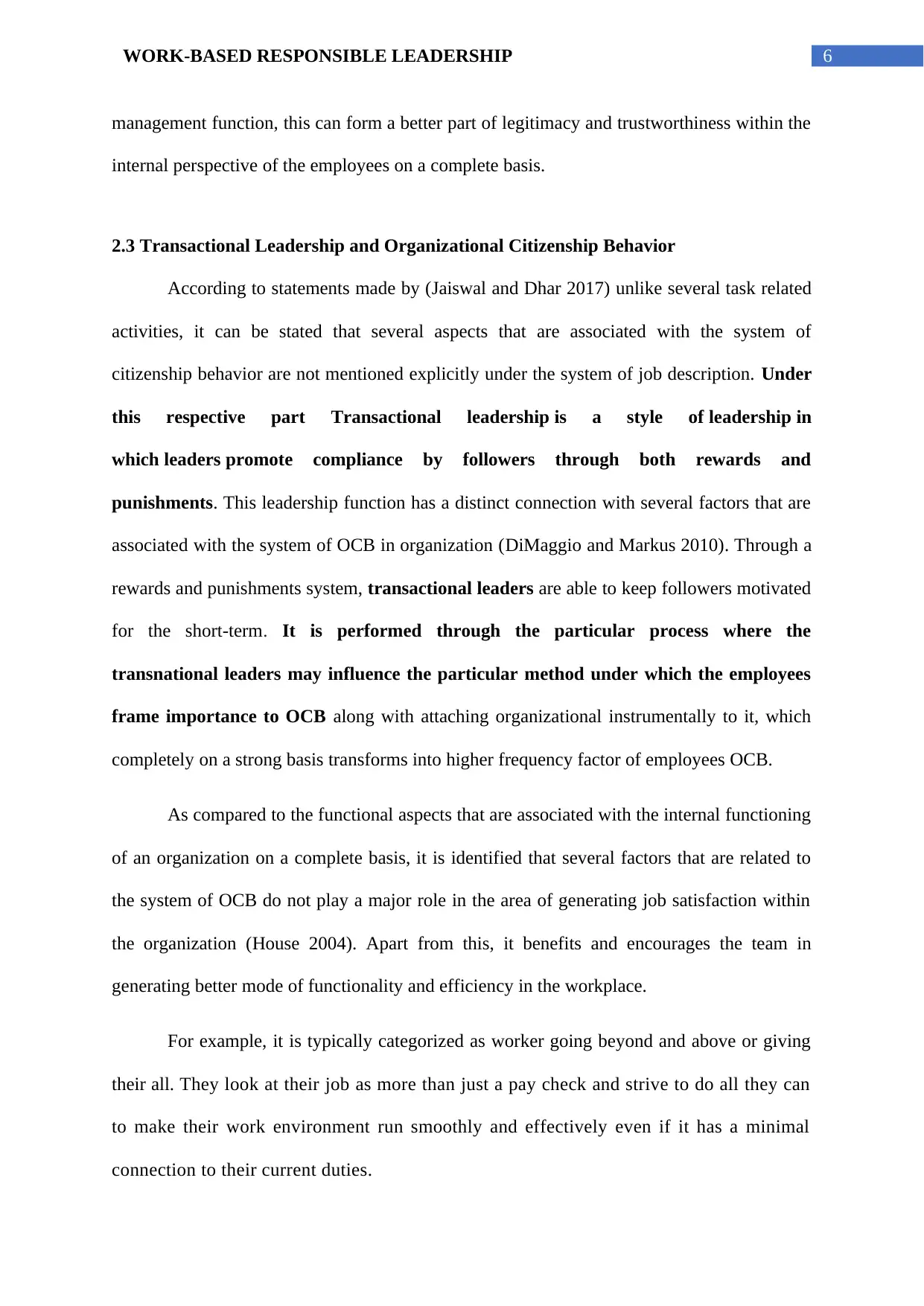
6WORK-BASED RESPONSIBLE LEADERSHIP
management function, this can form a better part of legitimacy and trustworthiness within the
internal perspective of the employees on a complete basis.
2.3 Transactional Leadership and Organizational Citizenship Behavior
According to statements made by (Jaiswal and Dhar 2017) unlike several task related
activities, it can be stated that several aspects that are associated with the system of
citizenship behavior are not mentioned explicitly under the system of job description. Under
this respective part Transactional leadership is a style of leadership in
which leaders promote compliance by followers through both rewards and
punishments. This leadership function has a distinct connection with several factors that are
associated with the system of OCB in organization (DiMaggio and Markus 2010). Through a
rewards and punishments system, transactional leaders are able to keep followers motivated
for the short-term. It is performed through the particular process where the
transnational leaders may influence the particular method under which the employees
frame importance to OCB along with attaching organizational instrumentally to it, which
completely on a strong basis transforms into higher frequency factor of employees OCB.
As compared to the functional aspects that are associated with the internal functioning
of an organization on a complete basis, it is identified that several factors that are related to
the system of OCB do not play a major role in the area of generating job satisfaction within
the organization (House 2004). Apart from this, it benefits and encourages the team in
generating better mode of functionality and efficiency in the workplace.
For example, it is typically categorized as worker going beyond and above or giving
their all. They look at their job as more than just a pay check and strive to do all they can
to make their work environment run smoothly and effectively even if it has a minimal
connection to their current duties.
management function, this can form a better part of legitimacy and trustworthiness within the
internal perspective of the employees on a complete basis.
2.3 Transactional Leadership and Organizational Citizenship Behavior
According to statements made by (Jaiswal and Dhar 2017) unlike several task related
activities, it can be stated that several aspects that are associated with the system of
citizenship behavior are not mentioned explicitly under the system of job description. Under
this respective part Transactional leadership is a style of leadership in
which leaders promote compliance by followers through both rewards and
punishments. This leadership function has a distinct connection with several factors that are
associated with the system of OCB in organization (DiMaggio and Markus 2010). Through a
rewards and punishments system, transactional leaders are able to keep followers motivated
for the short-term. It is performed through the particular process where the
transnational leaders may influence the particular method under which the employees
frame importance to OCB along with attaching organizational instrumentally to it, which
completely on a strong basis transforms into higher frequency factor of employees OCB.
As compared to the functional aspects that are associated with the internal functioning
of an organization on a complete basis, it is identified that several factors that are related to
the system of OCB do not play a major role in the area of generating job satisfaction within
the organization (House 2004). Apart from this, it benefits and encourages the team in
generating better mode of functionality and efficiency in the workplace.
For example, it is typically categorized as worker going beyond and above or giving
their all. They look at their job as more than just a pay check and strive to do all they can
to make their work environment run smoothly and effectively even if it has a minimal
connection to their current duties.
Paraphrase This Document
Need a fresh take? Get an instant paraphrase of this document with our AI Paraphraser
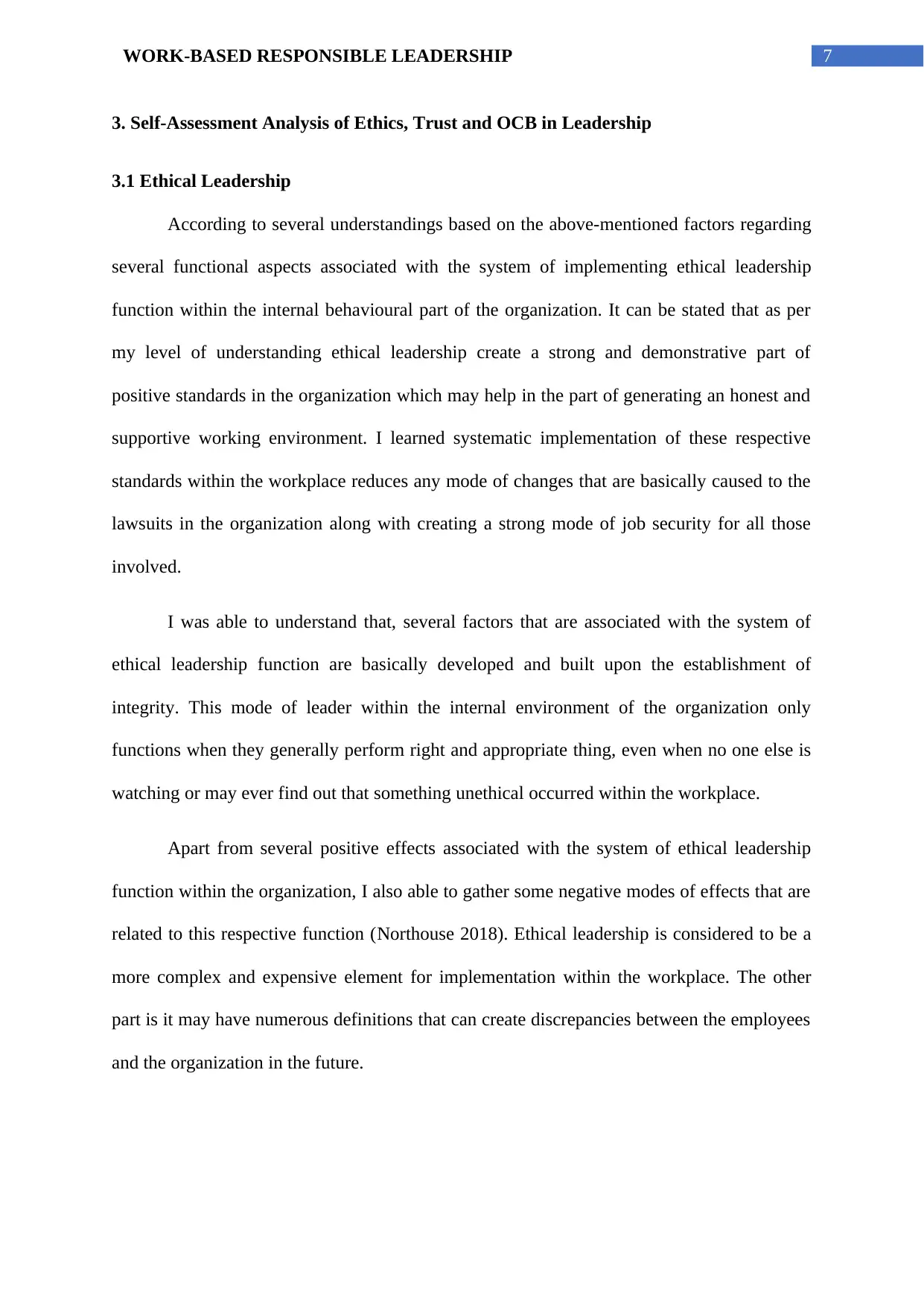
7WORK-BASED RESPONSIBLE LEADERSHIP
3. Self-Assessment Analysis of Ethics, Trust and OCB in Leadership
3.1 Ethical Leadership
According to several understandings based on the above-mentioned factors regarding
several functional aspects associated with the system of implementing ethical leadership
function within the internal behavioural part of the organization. It can be stated that as per
my level of understanding ethical leadership create a strong and demonstrative part of
positive standards in the organization which may help in the part of generating an honest and
supportive working environment. I learned systematic implementation of these respective
standards within the workplace reduces any mode of changes that are basically caused to the
lawsuits in the organization along with creating a strong mode of job security for all those
involved.
I was able to understand that, several factors that are associated with the system of
ethical leadership function are basically developed and built upon the establishment of
integrity. This mode of leader within the internal environment of the organization only
functions when they generally perform right and appropriate thing, even when no one else is
watching or may ever find out that something unethical occurred within the workplace.
Apart from several positive effects associated with the system of ethical leadership
function within the organization, I also able to gather some negative modes of effects that are
related to this respective function (Northouse 2018). Ethical leadership is considered to be a
more complex and expensive element for implementation within the workplace. The other
part is it may have numerous definitions that can create discrepancies between the employees
and the organization in the future.
3. Self-Assessment Analysis of Ethics, Trust and OCB in Leadership
3.1 Ethical Leadership
According to several understandings based on the above-mentioned factors regarding
several functional aspects associated with the system of implementing ethical leadership
function within the internal behavioural part of the organization. It can be stated that as per
my level of understanding ethical leadership create a strong and demonstrative part of
positive standards in the organization which may help in the part of generating an honest and
supportive working environment. I learned systematic implementation of these respective
standards within the workplace reduces any mode of changes that are basically caused to the
lawsuits in the organization along with creating a strong mode of job security for all those
involved.
I was able to understand that, several factors that are associated with the system of
ethical leadership function are basically developed and built upon the establishment of
integrity. This mode of leader within the internal environment of the organization only
functions when they generally perform right and appropriate thing, even when no one else is
watching or may ever find out that something unethical occurred within the workplace.
Apart from several positive effects associated with the system of ethical leadership
function within the organization, I also able to gather some negative modes of effects that are
related to this respective function (Northouse 2018). Ethical leadership is considered to be a
more complex and expensive element for implementation within the workplace. The other
part is it may have numerous definitions that can create discrepancies between the employees
and the organization in the future.
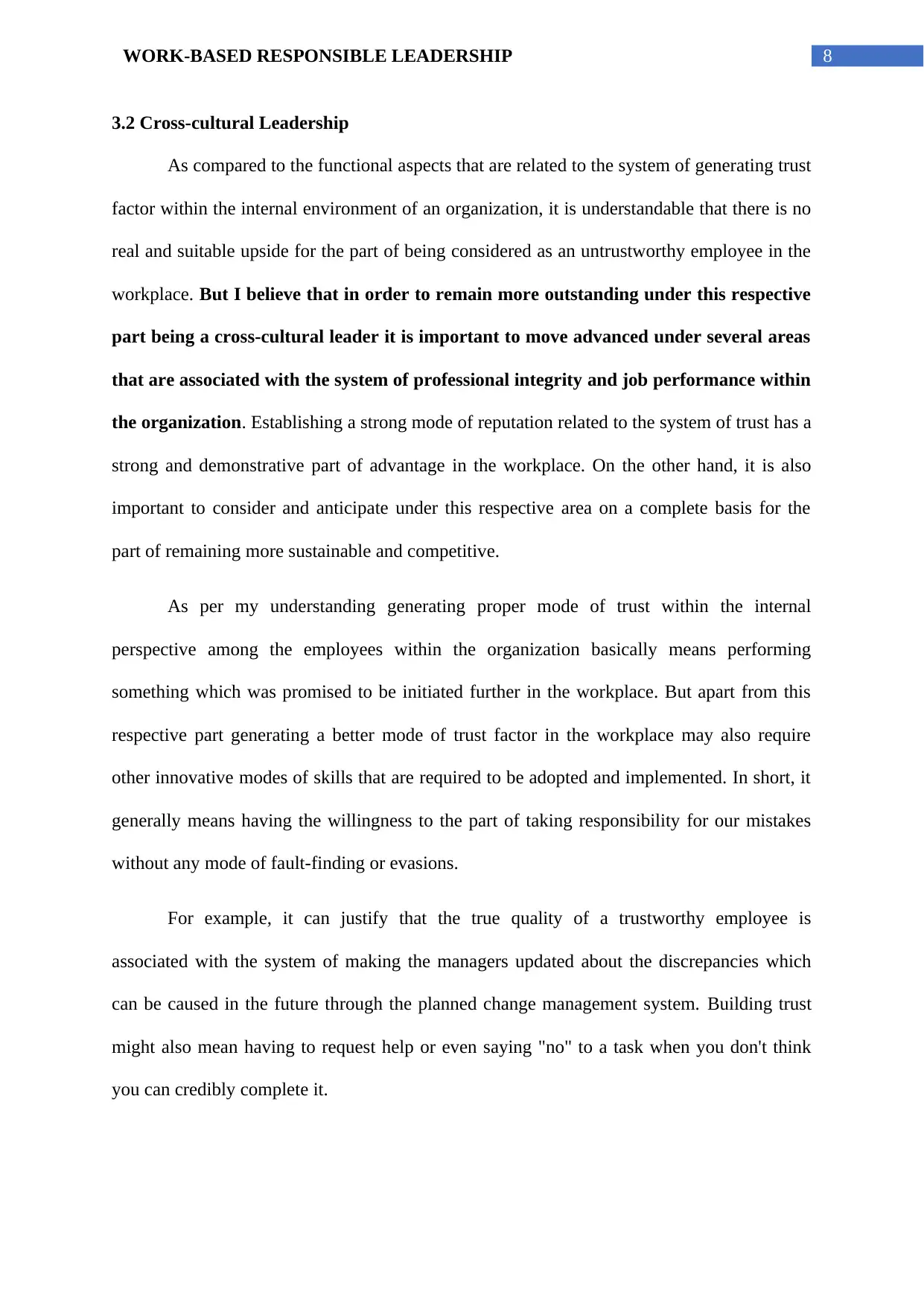
8WORK-BASED RESPONSIBLE LEADERSHIP
3.2 Cross-cultural Leadership
As compared to the functional aspects that are related to the system of generating trust
factor within the internal environment of an organization, it is understandable that there is no
real and suitable upside for the part of being considered as an untrustworthy employee in the
workplace. But I believe that in order to remain more outstanding under this respective
part being a cross-cultural leader it is important to move advanced under several areas
that are associated with the system of professional integrity and job performance within
the organization. Establishing a strong mode of reputation related to the system of trust has a
strong and demonstrative part of advantage in the workplace. On the other hand, it is also
important to consider and anticipate under this respective area on a complete basis for the
part of remaining more sustainable and competitive.
As per my understanding generating proper mode of trust within the internal
perspective among the employees within the organization basically means performing
something which was promised to be initiated further in the workplace. But apart from this
respective part generating a better mode of trust factor in the workplace may also require
other innovative modes of skills that are required to be adopted and implemented. In short, it
generally means having the willingness to the part of taking responsibility for our mistakes
without any mode of fault-finding or evasions.
For example, it can justify that the true quality of a trustworthy employee is
associated with the system of making the managers updated about the discrepancies which
can be caused in the future through the planned change management system. Building trust
might also mean having to request help or even saying "no" to a task when you don't think
you can credibly complete it.
3.2 Cross-cultural Leadership
As compared to the functional aspects that are related to the system of generating trust
factor within the internal environment of an organization, it is understandable that there is no
real and suitable upside for the part of being considered as an untrustworthy employee in the
workplace. But I believe that in order to remain more outstanding under this respective
part being a cross-cultural leader it is important to move advanced under several areas
that are associated with the system of professional integrity and job performance within
the organization. Establishing a strong mode of reputation related to the system of trust has a
strong and demonstrative part of advantage in the workplace. On the other hand, it is also
important to consider and anticipate under this respective area on a complete basis for the
part of remaining more sustainable and competitive.
As per my understanding generating proper mode of trust within the internal
perspective among the employees within the organization basically means performing
something which was promised to be initiated further in the workplace. But apart from this
respective part generating a better mode of trust factor in the workplace may also require
other innovative modes of skills that are required to be adopted and implemented. In short, it
generally means having the willingness to the part of taking responsibility for our mistakes
without any mode of fault-finding or evasions.
For example, it can justify that the true quality of a trustworthy employee is
associated with the system of making the managers updated about the discrepancies which
can be caused in the future through the planned change management system. Building trust
might also mean having to request help or even saying "no" to a task when you don't think
you can credibly complete it.
⊘ This is a preview!⊘
Do you want full access?
Subscribe today to unlock all pages.

Trusted by 1+ million students worldwide
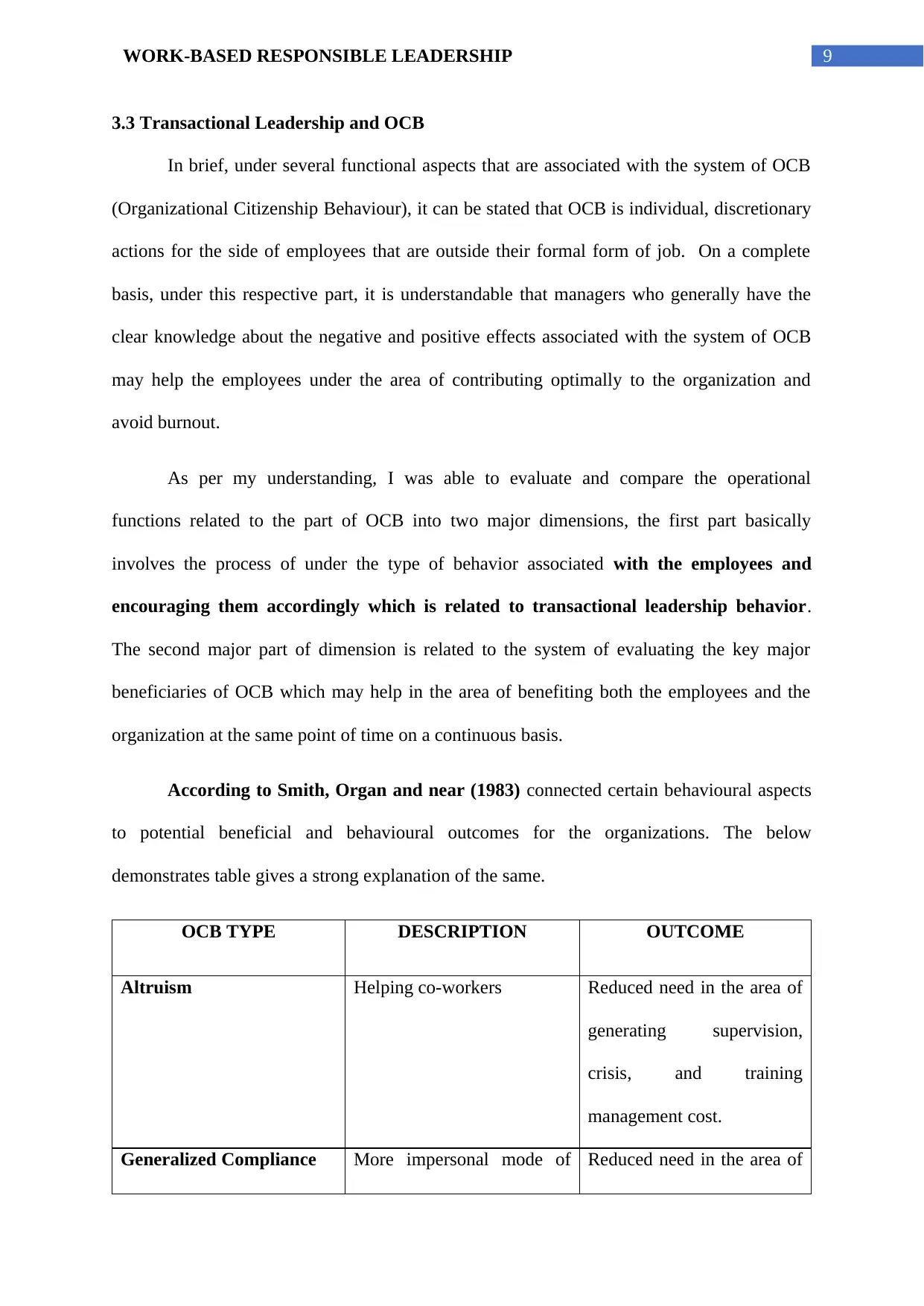
9WORK-BASED RESPONSIBLE LEADERSHIP
3.3 Transactional Leadership and OCB
In brief, under several functional aspects that are associated with the system of OCB
(Organizational Citizenship Behaviour), it can be stated that OCB is individual, discretionary
actions for the side of employees that are outside their formal form of job. On a complete
basis, under this respective part, it is understandable that managers who generally have the
clear knowledge about the negative and positive effects associated with the system of OCB
may help the employees under the area of contributing optimally to the organization and
avoid burnout.
As per my understanding, I was able to evaluate and compare the operational
functions related to the part of OCB into two major dimensions, the first part basically
involves the process of under the type of behavior associated with the employees and
encouraging them accordingly which is related to transactional leadership behavior.
The second major part of dimension is related to the system of evaluating the key major
beneficiaries of OCB which may help in the area of benefiting both the employees and the
organization at the same point of time on a continuous basis.
According to Smith, Organ and near (1983) connected certain behavioural aspects
to potential beneficial and behavioural outcomes for the organizations. The below
demonstrates table gives a strong explanation of the same.
OCB TYPE DESCRIPTION OUTCOME
Altruism Helping co-workers Reduced need in the area of
generating supervision,
crisis, and training
management cost.
Generalized Compliance More impersonal mode of Reduced need in the area of
3.3 Transactional Leadership and OCB
In brief, under several functional aspects that are associated with the system of OCB
(Organizational Citizenship Behaviour), it can be stated that OCB is individual, discretionary
actions for the side of employees that are outside their formal form of job. On a complete
basis, under this respective part, it is understandable that managers who generally have the
clear knowledge about the negative and positive effects associated with the system of OCB
may help the employees under the area of contributing optimally to the organization and
avoid burnout.
As per my understanding, I was able to evaluate and compare the operational
functions related to the part of OCB into two major dimensions, the first part basically
involves the process of under the type of behavior associated with the employees and
encouraging them accordingly which is related to transactional leadership behavior.
The second major part of dimension is related to the system of evaluating the key major
beneficiaries of OCB which may help in the area of benefiting both the employees and the
organization at the same point of time on a continuous basis.
According to Smith, Organ and near (1983) connected certain behavioural aspects
to potential beneficial and behavioural outcomes for the organizations. The below
demonstrates table gives a strong explanation of the same.
OCB TYPE DESCRIPTION OUTCOME
Altruism Helping co-workers Reduced need in the area of
generating supervision,
crisis, and training
management cost.
Generalized Compliance More impersonal mode of Reduced need in the area of
Paraphrase This Document
Need a fresh take? Get an instant paraphrase of this document with our AI Paraphraser
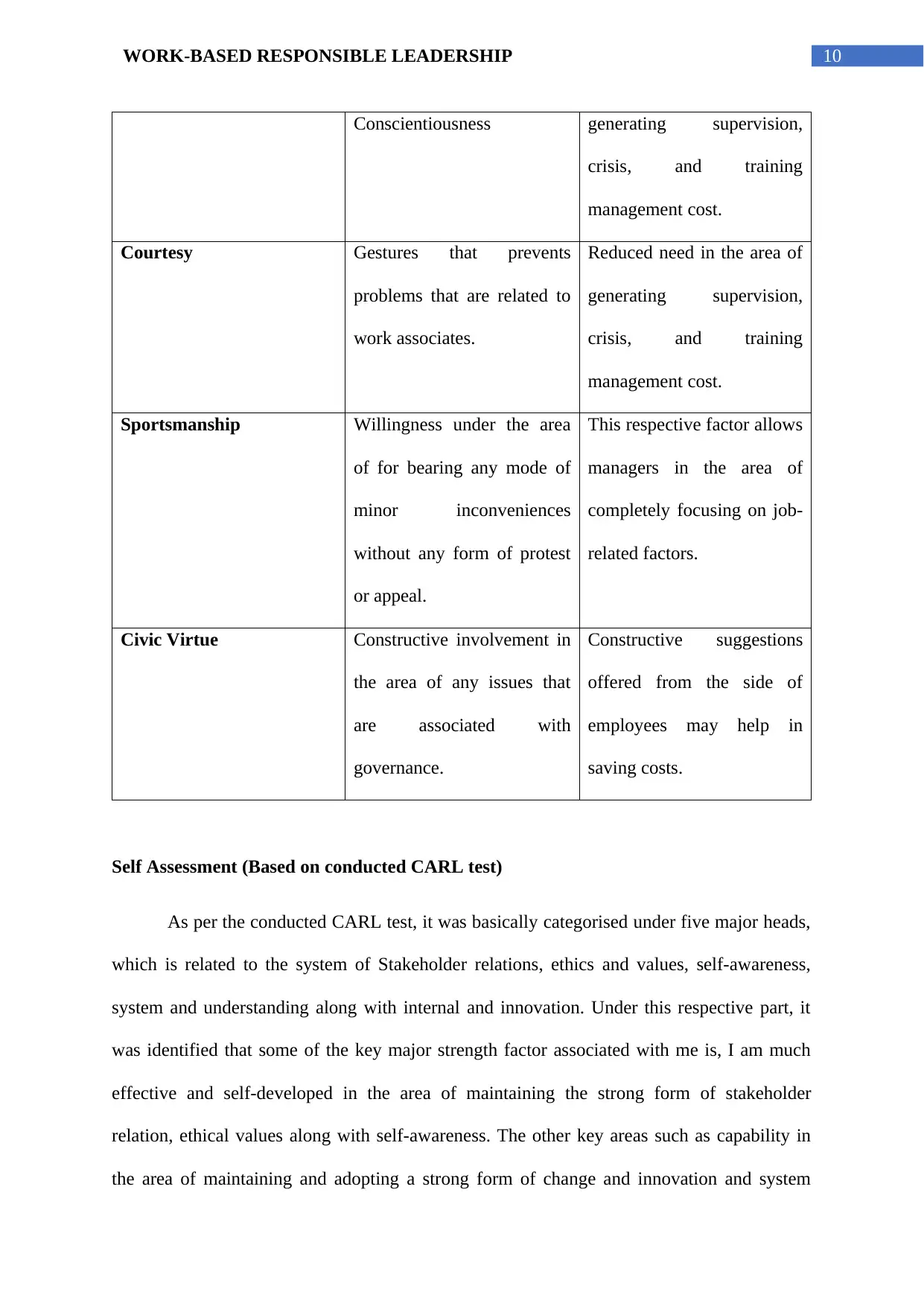
10WORK-BASED RESPONSIBLE LEADERSHIP
Conscientiousness generating supervision,
crisis, and training
management cost.
Courtesy Gestures that prevents
problems that are related to
work associates.
Reduced need in the area of
generating supervision,
crisis, and training
management cost.
Sportsmanship Willingness under the area
of for bearing any mode of
minor inconveniences
without any form of protest
or appeal.
This respective factor allows
managers in the area of
completely focusing on job-
related factors.
Civic Virtue Constructive involvement in
the area of any issues that
are associated with
governance.
Constructive suggestions
offered from the side of
employees may help in
saving costs.
Self Assessment (Based on conducted CARL test)
As per the conducted CARL test, it was basically categorised under five major heads,
which is related to the system of Stakeholder relations, ethics and values, self-awareness,
system and understanding along with internal and innovation. Under this respective part, it
was identified that some of the key major strength factor associated with me is, I am much
effective and self-developed in the area of maintaining the strong form of stakeholder
relation, ethical values along with self-awareness. The other key areas such as capability in
the area of maintaining and adopting a strong form of change and innovation and system
Conscientiousness generating supervision,
crisis, and training
management cost.
Courtesy Gestures that prevents
problems that are related to
work associates.
Reduced need in the area of
generating supervision,
crisis, and training
management cost.
Sportsmanship Willingness under the area
of for bearing any mode of
minor inconveniences
without any form of protest
or appeal.
This respective factor allows
managers in the area of
completely focusing on job-
related factors.
Civic Virtue Constructive involvement in
the area of any issues that
are associated with
governance.
Constructive suggestions
offered from the side of
employees may help in
saving costs.
Self Assessment (Based on conducted CARL test)
As per the conducted CARL test, it was basically categorised under five major heads,
which is related to the system of Stakeholder relations, ethics and values, self-awareness,
system and understanding along with internal and innovation. Under this respective part, it
was identified that some of the key major strength factor associated with me is, I am much
effective and self-developed in the area of maintaining the strong form of stakeholder
relation, ethical values along with self-awareness. The other key areas such as capability in
the area of maintaining and adopting a strong form of change and innovation and system
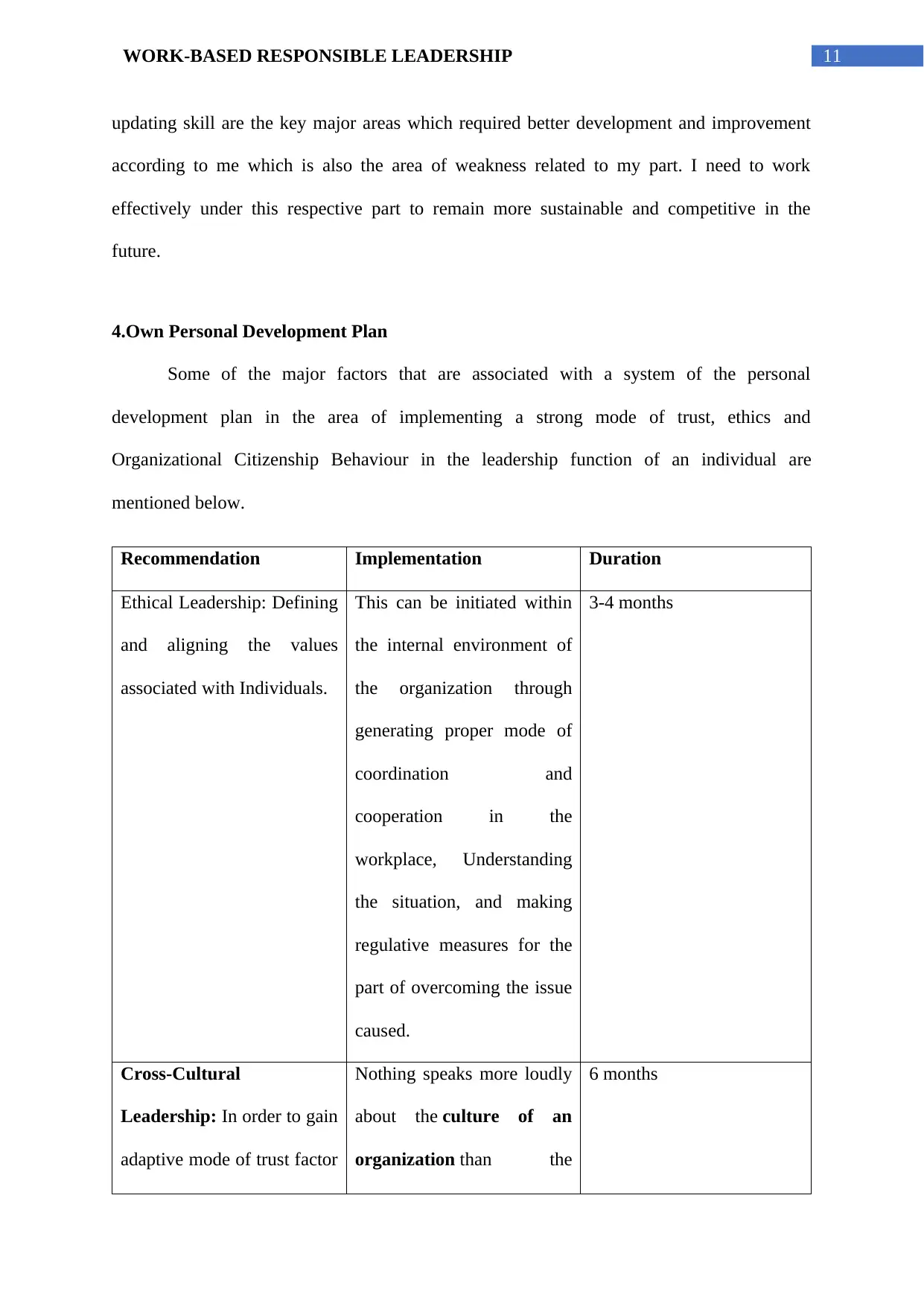
11WORK-BASED RESPONSIBLE LEADERSHIP
updating skill are the key major areas which required better development and improvement
according to me which is also the area of weakness related to my part. I need to work
effectively under this respective part to remain more sustainable and competitive in the
future.
4.Own Personal Development Plan
Some of the major factors that are associated with a system of the personal
development plan in the area of implementing a strong mode of trust, ethics and
Organizational Citizenship Behaviour in the leadership function of an individual are
mentioned below.
Recommendation Implementation Duration
Ethical Leadership: Defining
and aligning the values
associated with Individuals.
This can be initiated within
the internal environment of
the organization through
generating proper mode of
coordination and
cooperation in the
workplace, Understanding
the situation, and making
regulative measures for the
part of overcoming the issue
caused.
3-4 months
Cross-Cultural
Leadership: In order to gain
adaptive mode of trust factor
Nothing speaks more loudly
about the culture of an
organization than the
6 months
updating skill are the key major areas which required better development and improvement
according to me which is also the area of weakness related to my part. I need to work
effectively under this respective part to remain more sustainable and competitive in the
future.
4.Own Personal Development Plan
Some of the major factors that are associated with a system of the personal
development plan in the area of implementing a strong mode of trust, ethics and
Organizational Citizenship Behaviour in the leadership function of an individual are
mentioned below.
Recommendation Implementation Duration
Ethical Leadership: Defining
and aligning the values
associated with Individuals.
This can be initiated within
the internal environment of
the organization through
generating proper mode of
coordination and
cooperation in the
workplace, Understanding
the situation, and making
regulative measures for the
part of overcoming the issue
caused.
3-4 months
Cross-Cultural
Leadership: In order to gain
adaptive mode of trust factor
Nothing speaks more loudly
about the culture of an
organization than the
6 months
⊘ This is a preview!⊘
Do you want full access?
Subscribe today to unlock all pages.

Trusted by 1+ million students worldwide
1 out of 16
Related Documents
Your All-in-One AI-Powered Toolkit for Academic Success.
+13062052269
info@desklib.com
Available 24*7 on WhatsApp / Email
![[object Object]](/_next/static/media/star-bottom.7253800d.svg)
Unlock your academic potential
Copyright © 2020–2026 A2Z Services. All Rights Reserved. Developed and managed by ZUCOL.





